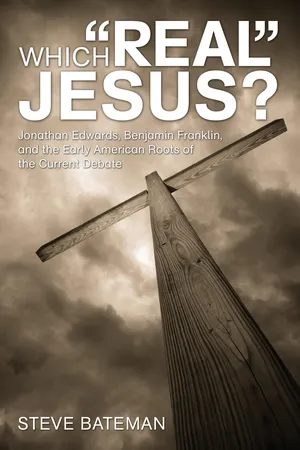
Which "Real" Jesus?
Jonathan Edwards, Benjamin Franklin, and the Early American Roots of the Current Debate
- 196 pages
- English
- ePUB (mobile friendly)
- Available on iOS & Android
Which "Real" Jesus?
Jonathan Edwards, Benjamin Franklin, and the Early American Roots of the Current Debate
About this book
_ Are the gospels reliable accounts of Jesus?_ Did Jesus claim to be God?_ Was Jesus bodily raised from the dead?_ Is Jesus the only way to salvation?_ Are Christianity and Islam basically the same?_ Were the Founding Fathers orthodox Christians?Christians in America are routinely confronted with news of archaeological discoveries or new scholarship claiming to present the real Jesus. These challenges have a long tradition in America and can be traced to some of the best-known founders of our nation. In pre-Revolutionary America, the formidable Jonathan Edwards directly confronted the challenge, providing an enduring model for Christians today who desire to articulate and defend the historic, orthodox doctrine of Christ. While Edwards sought to prove the historic Jesus, Benjamin Franklin attempted to improve on the original, offering a Jesus of more practical use to his social and civic purposes. Franklin's approach, inspired by Deist thinkers and refined by Thomas Jefferson, has found new life in the advocates of the Jesus Seminar and of other alternative Christianities. Even the ambassadors of strident atheism-Richard Dawkins, Christopher Hitchens, and Sam Harris-are resurrecting Deist arguments in their best-selling books. These skeptics notably follow the Deist tactic of using the rise of Islam to undermine the uniqueness of Jesus. As a result, there is a widespread erosion of confidence among professing Christians in the supremacy of Jesus Christ. Which Real Jesus? reveals that these new views of the real Jesus are, in fact, old news.
Frequently asked questions
- Essential is ideal for learners and professionals who enjoy exploring a wide range of subjects. Access the Essential Library with 800,000+ trusted titles and best-sellers across business, personal growth, and the humanities. Includes unlimited reading time and Standard Read Aloud voice.
- Complete: Perfect for advanced learners and researchers needing full, unrestricted access. Unlock 1.4M+ books across hundreds of subjects, including academic and specialized titles. The Complete Plan also includes advanced features like Premium Read Aloud and Research Assistant.
Please note we cannot support devices running on iOS 13 and Android 7 or earlier. Learn more about using the app.
Information
Introduction
Jesus in America, 1758
Table of contents
- Title Page
- Acknowledgments
- Chapter 1: Introduction
- Chapter 2: Jesus in America, 1758
- Chapter 3: Playing the Scholar Card
- Chapter 4: Gospels: “They Ridicule the Story about Jesus”
- Chapter 5: God: “If Not, the Greatest Imposter”
- Chapter 6: Grave: “The Grand Evidence”
- Chapter 7: Grace: “A Free Gift”
- Chapter 8: Islam as a Deist Argument
- Chapter 9: Growth: “By Such Weapons as These”
- Chapter 10: Conclusion
- Appendix
- Bibliography